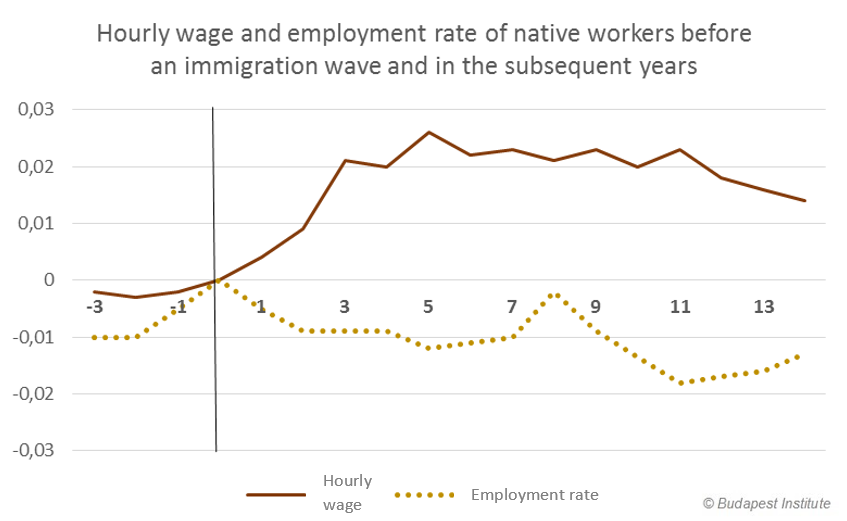good governance business environment education employment roma integration taxation welfare
Immigration helps the career of native workersThe new immigration wave to Western Europe in the past two years has directed attention to whether the labour market prospects of domestic workers worsened if there is a large number of immigrants (or refugees) coming to the country. The short answer is “No.” In fact, the domestic workers benefit from wage growth without a significant decrease in their employment already 3-4 years after the arrival of the immigrants. Mette and Peri (2016) examine the impact of typically low-skilled refugees on the domestic labour force with similar skills in Denmark between 1991 and 2008. The figure below summarizes their conclusions and shows that the wages of the domestic labour force have increased and the employment has not decreased.
*The employment effect is not statistically significant The vertical axis represents percentage values. The horizontal axis represents the years relative to the year of immigration (the year of immigration = year 0). Source: Foged, Mette és Giovanni Peri. 2016. "Immigrants' Effect on Native Workers: New Analysis on Longitudinal Data." American Economic Journal: Applied Economics, 8(2): 1-34.
How is this possible? In general, the immigrants from outside the European Union try to find a job in manual labour due to a lack of necessary language skills or professional qualifications. This leads to an increase in competition for domestic workers in this kind of jobs and are detrimental to their chances on the labour market. However, the majority of domestic workers can move into higher ranking and better paid jobs that require more complex work. In order for this positive trend to develop, it is necessary for the domestic workers to have basic skills that they can build on to be able to perform more complex tasks. Consequently, Hungary can only turn immigration to its advantage in case secondary education will put more emphasis on developing basic skills. The above conclusions are elaborated on in more detail in our short study which appeared in the 2015 edition of the “Hungarian Labour Market”. In this study we relied on about twenty empirical economic studies published in the last fifteen years (based on mostly Western European data) which examine the impact of immigration on the wages and employment of domestic workers. | |||
| Project details | |||
| Client | Hungarian Academy of Sciences CERS – Institute of Economics http://www.mtakti.hu/ | ||
| Project leader | Márton Csillag | ||
| Duration | 15/09/2015 - 25/10/2015 | ||
| Documents | |||
| study | The effect of migration on the labour market outcome of native workers in Europe (in Hungarian) | ||









